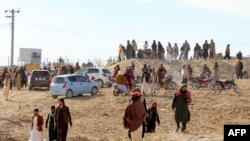Afghanistan’s Taliban authorities publicly flogged six individuals on Tuesday after convicting them of offenses such as adultery, sodomy and eloping.
The Supreme Court of the de facto Afghan rulers announced that the punishments were carried out in southeastern Khost and northern Faryab provinces and that the individuals received 39 lashes each, along with varying prison sentences of up to 18 months.
Since the beginning of February, at least 61 Afghans, including nine women, have been flogged in sports stadiums packed with ordinary citizens and Taliban officials from the judiciary and administration, according to data from the top court. The individuals were accused of adultery, eloping, sodomy and robbery, with many of them also receiving prison sentences ranging from several months to six years.
The United Nations and human rights organizations have condemned corporal punishment in Afghanistan as a violation of international law, urging the Taliban to immediately cease the practice.
Despite global outcry, hundreds of Afghan men and women have faced public flogging, and several have been executed under the Taliban’s interpretation of retributive justice, known as qisas.
Last week, reclusive Taliban Supreme Leader Hibatullah Akhundzada defended his governance, including the criminal justice system, saying they were rooted in divine commands.
“The esteemed supreme leader stated that every decree he issues is based on consultation with scholars and derived from the Quran and Hadith [sayings of Islam’s Prophet Muhammad] and represents commands of Allah,” a government spokesman quoted Akhundzada as telling a gathering in Kandahar.
Akhundzada, who is based in the southern Afghan city of Kandahar, has issued numerous decrees in accordance with his stringent interpretation of Islamic law and principles, resulting in restrictions on freedom of speech and female access to education and employment in the country.
The Taliban leader has banned girls’ education beyond the sixth grade and blocked many women from public and private sector employment. Afghan women cannot travel by road or air without a chaperone and cannot visit public places such as parks, gyms or beauty salons.
The U.N. Assistance Mission in Afghanistan emphasized again on X Tuesday that restrictions on women “are causing long-term damage” in the impoverished, war-torn country.
The chief prosecutor of the Hague-based International Criminal Court last month announced he was seeking arrest warrants for Akhundzada and the Taliban chief justice, holding them “criminally responsible for persecuting Afghan girls and women.”
The Taliban dismissed the warrants as “devoid of just legal basis, duplicitous in nature and politically motivated.”
No country has recognized the Taliban as the legitimate governing authority of the country, primarily due to the harsh treatment of Afghan women.





